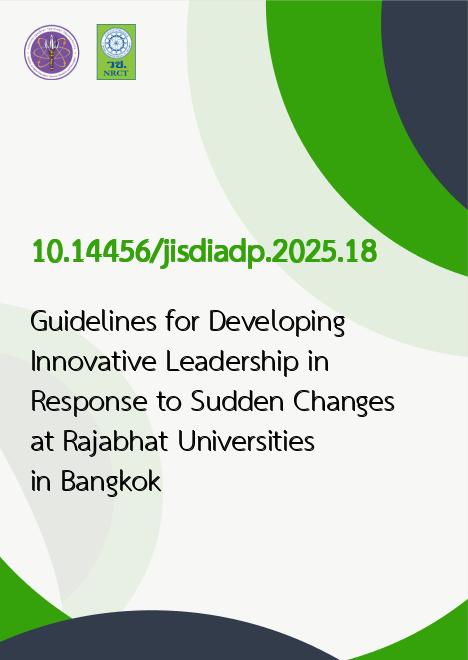
|
Guidelines for Developing Innovative Leadership in Response to Sudden Changes at Rajabhat Universities in Bangkok |
|---|---|
| รหัสดีโอไอ | |
| Creator | Ntapat Worapongpat |
| Title | Guidelines for Developing Innovative Leadership in Response to Sudden Changes at Rajabhat Universities in Bangkok |
| Publisher | DR.KET INSTITUTE OF ACADEMIC DEVELOPMENT AND PROMOTION |
| Publication Year | 2568 |
| Journal Title | Journal of Interdisciplinary Social Development |
| Journal Vol. | 3 |
| Journal No. | 1 |
| Page no. | 252-286 |
| Keyword | Agility and Adaptability, Collaboration and Empowerment, Visionary Leadership |
| URL Website | https://so12.tci-thaijo.org/index.php/JISDIADP/about |
| Website title | https://so12.tci-thaijo.org/index.php/JISDIADP/index |
| ISSN | 2822-1060 |
| Abstract | In the rapidly evolving landscape of higher education, Rajabhat Universities in Bangkok face critical challenges that demand innovative and adaptive leadership. As educational institutions navigate unprecedented changes, effective leadership development becomes essential to fostering resilience and driving transformation. This research aims to examine the characteristics and components essential to innovative leadership and to propose a framework for developing such leadership to respond effectively to immediate and unforeseen changes. Through a comprehensive study of documents and empirical data, including in-depth interviews with administrators from nine successful vocational education institutions, the research constructs a framework encompassing three dimensions of adaptive leadership: personal characteristics, academic and research development, and personnel development.The study further refines these insights by developing a questionnaire based on a rating scale, which was distributed to 285 administrators and personnel from three Rajabhat University institutions in Bangkok. Employing a mixed-methods approach, combining quantitative and qualitative research, the study utilized exploratory factor analysis, data triangulation, and expert discussions to validate the proposed guidelines. Findings identified nine key components of adaptive leadership for Rajabhat University administrators: (1) influence through ideological prestige, (2) inspirational motivation, (3) strategic agility and opportunity-seeking, (4) establishment of an educational innovation ecosystem, (5) consideration of individual needs, (6) cultivation of a positive organizational culture, (7) fostering a creative and values-driven atmosphere, (8) development of innovative leadership skills, (9) intellectual stimulation, and (10) advancement of digital career skills.These findings provide actionable guidelines for enhancing the competencies of Rajabhat University administrators in Bangkok, equipping them with adaptive leadership skills necessary to navigate the "new normal" and future challenges. Implementing these guidelines can help Rajabhat Universities in Bangkok uphold quality standards for higher education qualifications and sustain institutional excellence.Background and AimIn the context of higher education, Rajabhat Universities in Bangkok are increasingly confronted with multifaceted challenges driven by rapid technological advancements, evolving societal expectations, and unprecedented global events. These pressures necessitate a paradigm shift in leadership practices, where traditional models of governance are no longer sufficient to address the dynamic nature of contemporary educational environments. The purpose of this research is to identify and elucidate the characteristics and components that constitute innovative leadership within Rajabhat Universities, thereby establishing a comprehensive framework for the development of adaptive leadership. This framework aims to empower university administrators to navigate immediate and unforeseen challenges effectively, ensuring institutional resilience and sustainability in a volatile educational landscape. By investigating these dimensions, the study seeks to contribute to the ongoing discourse on leadership in higher education, providing actionable insights that enhance the overall effectiveness of Rajabhat Universities in meeting their strategic goals.Materials and MethodsThis research employs a mixed-methods approach to gather a comprehensive understanding of innovative leadership within Rajabhat Universities. Initially, a thorough review of relevant literature was conducted to establish a theoretical foundation and identify the key characteristics of adaptive leadership. Subsequently, qualitative data were collected through in-depth interviews with administrators from nine successful vocational education institutions, enabling the exploration of lived experiences and practical insights regarding leadership challenges and practices. The findings from the qualitative phase informed the development of a structured questionnaire, which was then administered to a sample of 285 administrators and personnel from three Rajabhat Universities in Bangkok. The questionnaire utilized a rating scale to quantitatively assess perceptions of leadership characteristics. Data analysis included exploratory factor analysis to identify underlying structures within the collected data, complemented by data triangulation and discussions with experts to validate the findings. This robust methodological framework ensures a comprehensive examination of the characteristics and components of innovative leadership within the unique context of Rajabhat Universities.ResultsThe analysis revealed nine critical components of adaptive leadership pertinent to administrators at Rajabhat Universities. These components include: (1) Influence through Ideological Prestige – the capacity to inspire trust and credibility; (2) Inspirational Motivation – the ability to foster enthusiasm and a shared vision; (3) Strategic Agility and Opportunity-Seeking – the knack for identifying and leveraging emerging opportunities; (4) Establishment of an Educational Innovation Ecosystem – the creation of an environment conducive to innovative practices; (5) Consideration of Individual Needs – addressing the diverse needs of stakeholders; (6) Cultivation of a Positive Organizational Culture – fostering a supportive and collaborative atmosphere; (7) Fostering a Creative and Values-Driven Atmosphere – promoting creativity aligned with institutional values; (8) Development of Innovative Leadership Skills – enhancing personal capabilities in innovative practices; and (9) Advancement of Digital Career Skills – equipping administrators with the necessary digital competencies. These findings not only elucidate the essential attributes of adaptive leadership but also provide a structured approach for enhancing the capabilities of Rajabhat University administratorsThis research underscores the imperative for Rajabhat Universities in Bangkok to cultivate innovative leadership that is responsive to the evolving landscape of higher education. By identifying and articulating the key components of adaptive leadership, this study offers a strategic framework that equips university administrators with the necessary skills and competencies to navigate the complexities of the "new normal." Implementing the proposed guidelines can significantly enhance the leadership capacities of Rajabhat University administrators, thereby facilitating the maintenance of quality standards in higher education and sustaining institutional excellence. Ultimately, fostering adaptive leadership is not merely a response to current challenges but a proactive investment in the future of educational institutions, ensuring they remain at the forefront of transformative change and societal impact. |
